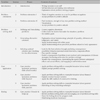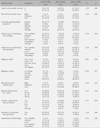Abstract
Purpose
The purpose of this study was to analyze effects of a problem-solving program on problem-solving ability, self-esteem, and depression for middle school girls with depression.
Methods
This quasi-experimental study was designed with a nonequivalent control group pre-post test. The research participants were middle school girls (N=82; experimental group=32, control group=50) whose CES-D score was higher than 24. The problem solving program consisted of 10 sessions (90 min/session) was composed of introduction, problem orientation, problem solving skills, case application, and ending. The outcomes were measured by the Social Problem-Solving Inventory-Revised (SPSI-R), Rosenberg Self-Esteem (RSE), and Center for Epidemiologic Studies Depression Scale (CES-D).
Results
The experimental group showed significantly higher levels of problem solving ability (t=3.10, p=.003) and lower depression levels (t=-2.60, p=.011) than the control group after completing the program. The levels of self-esteem of the experimental group were improved after the program but the changes in self-esteem were not reached to the significant levels when compared with those of control group (t=1.64, p=.104).
Figures and Tables
Table 4
Effects of the Problem Solving Program on Problem-solving Ability, Self-esteem, and Depression (N=82)

PPO=positive orientation; NPO=negative orientation; RPS=rational problem-solving style; ICS=impulsive careless style; AS=avoidance style; Exp=experimental group; Cont=control group; Post-pre=mean scores at post test-mean scores at pre test.
†t-test for changed score between pre-post test; ‡Experimental group paired t-test: t=-3.62, p<.001; Control group paired t-test: t=-2.77, p<.05; §Increasing of the value means decreasing of problem-solving ability.
References
1. Cho SJ, Jeon HJ, Kim JK, Suh TW, Kim SU, Hahm BJ, et al. Prevalence of suicide behaviors (suicidal ideation and suicide attempts) and risk factors of suicide attempts in Junior and high school adolescents. J Korean Neuropsychiatr Assoc. 2002; 41(6):1142–1155.
2. Choi YS. A study of the reliability and validity of the social problem solving inventory-revised (SPSI-R). Korean J Clin Psychol. 2002; 21(2):413–428.
3. D'Zurilla TJ, Nezu AM, Maydeu-Olivares A. Manual for the social problem-solving inventory-revised. North Tonawanda, NY: Multi-health Systems;2002.
4. D'Zurilla TJ, Nezu AM. Problem solving therapy: A positive approach to clinical intervention. 3rd ed. New York: Springer Publication;2007.
5. Eskin M, Ertekin K, Demir H. Efficacy of a problem solving therapy for depression and suicide potential adolescents and young adults. Cogn Ther Res. 2008; 32(2):227–245.

6. Ha EH, Oh KJ, Song DH. Psychosocial risk factors for comorbid adolescents with depression and anxiety. Korean J Psychol Gen. 2003; 22(2):127–144.
7. Huh K. The effects of impulsivity and social problem solving skills on Juvenile delinquency. Seoul: Hanyang University;1999. Unpublished master's thesis.
8. Jeon BJ. Self-esteem: A test of its measurability. Yonsei Nonchong. 1974; 11:107–124.
9. Kim BY. A meta-analysis of the variables related to adolescents' suicidal ideation. Chonnam: Chonnam National University;2008. Unpublished master's thesis.
10. Kim HW. (The) Relations among adolescents' depression, problem solving ability, self efficacy, and stressful life event. Seoul: Yonsei University;2006. Unpublished master's thesis.
11. Kim JS. Self-esteem, depression, and impulsivity of adolescents with the overuse of mobile phone. Seoul: Dankook University;2003. Unpublished master's thesis.
12. Kim KJ. Factors influencing depression of high school students: Focusing on risk, vulnerable, and protective factors. Chongju: Chongju University;2009. Unpublished doctoral dissertation.
13. Kim SK. The effects of self-esteem and self-control on social problem-solving. Daegu: Catholic University of Daegu;2009. Unpublished master's thesis.
14. Korea Centers for Disease Control and Prevention. The 3rd (2007) online survey statistics for health-behavior of adolescent. 2008. Retrieved January 9, 2009. from http://stat.mw.go.kr/homepage/data/part_data_content.jsp?menu_id=21&curr_page=1&board_bcd=6&ctrl_command=doNothing&seq_no=9976.
15. Kwon HR. Effectiveness of a problem-solving skill program for welfare nursing care workers. Seoul: Soongsil University;2005. Unpublished master's thesis.
16. Lee CS, Kweon YR, Kim SJ. The impact of school bullying victim and depression on suicidal ideation of middle school students. J Korean Acad Psychiatr Ment Health Nurs. 2007; 19(1):1–10.
17. Lee HJ, Kim YS, Kim KR, Kim JS, Seo JM. Predictors of depression among family caregivers of older adults with dementia. J Korean Acad Nurs. 2003; 33(7):936–944.

18. Lee MJ. Development and effects of a social problem solving training program for adolescents. Korean J Woman Psychother. 2004; 9(1):141–161.
19. Lee MJ. The effects of a social problem-solving training on delinquent and non-delinquent adolescents. Korean J Couns Psychother. 2006; 18(1):71–91.
20. Lee SH. (The) Effects of self-esteem and perceived social support on problem solving ability. Seoul: The Catholic University of Korea;1999. Unpublished master's thesis.
21. Lee SJ. Effects of a cognitive-behavioral group counseling program on body image, self-esteem, dysfunction attitudes, and depression of obese girl students in a middle school. Daegu: Keimyung University;2003. Unpublished master's thesis.
22. Min SY. Depression, self-esteem, and quality of life in a community population. J Korean Acad Psychiatr Ment Health Nurs. 2010; 19(1):1–10.

23. Nezu AM. Efficacy of a social problem solving therapy approach for unipolar depression. J Consult Clin Psychol. 1986; 54:196–202.

24. Nezu AM, Nezu CM, Perri MG. Problemsolving therapy for depression: Theory, research, and clinical guidelines. CA: Wiley Interscience;1989.
25. Nezu AM, Perri MG. Social problem-solving therapy for unipolar depression: An initial dismantling investigation. J Consult Clin Psychol. 1989; 57(3):408–413.

26. Radloff LS. The CES-D scale: A self-report depression scale for research in the general population. Appl Psychol Meas. 1977; 1(3):385–401.
27. Rosenberg M. Society and the adolescent self-image. Princeton, NJ: Princeton University Press;1965.
28. Shin SC, Kim MK, Yun KS, Kim JH, Lee MS, Moon SJ, et al. The center for epidemiologic studies-depression scale (CES-D): Its use in Korea standardization and factor structure of CES-D. J Korean Neuropsychiatr Assoc. 1991; 30(4):752–767.
29. Son HS, Kim GS. A study on the relations among depression, aggression, and draw-a-story response characteristics of middle school students. J Korean Home Manage Assoc. 2008; 26(5):405–418.
30. Statistical Research Institute. 2008 Adolescent statistics-4.5.2 cause of death for adolescents [data file]. Statistical Research Institute;2008. Retrieved January, 6, 2009. from http://epic.kdi.re.kr/epic/epic_view.jsp?num=94347&menu=1.




 PDF
PDF ePub
ePub Citation
Citation Print
Print





 XML Download
XML Download